As Election Day arrives, international students are worried about how the results of the race will affect national immigration policies and their visa statuses. Amid a pandemic and an economic recession, international students say that the next administration will greatly impact their lives as foreigners studying in the U.S.
Some international students said that they are following the 2020 election closely after being disappointed with the 2016 results.
“This time I feel it’s even more personal since I’m going to live in the States for the next four years,” Santiago Bustamante ’24 said. “The next president is going to affect the way we live in the States, and I really want to feel free, to feel safe as an international student and not under threat.”
President Donald Trump initially walked back policies allowing international students to stay in the country if their college instruction was remote. But shortly after the announcement, the administration reversed course, allowing international students to stay in the country even if classes were online.
Others feared that either administration’s victory could involve travel restrictions and border closures.
“I’m scared that, with COVID-19, the flights to India will be shut down, and it could mean that I won’t be able to go back home from college or there would be no way for my parents to visit me in the U.S.,” Ayesha Dhall ’24 said. “I hope that doesn’t happen, but that is definitely a fear of mine, especially if the pandemic gets worse.”
International students described ICE regulations and immigration policy proposals as having shaped their perspectives on both candidates and political parties.
“The immigration policies definitely play a role in my evaluation of the candidates, especially all the ICE directives we experienced over the summer which really affected whether or not we would be able to come to campus,” said Rhea Kale ’24, who has contributed to The Daily’s Grind section. “I also find that domestic policy, linked to human rights policy, is really important because that’s an important precedent for democracy as a whole and how we should be acting.”
Some international students have been getting involved with political groups on campus to voice their opinions and make a change.
“Through clubs, I have been able to learn more about the election myself,” said Kale, a frosh who joined Stanford Women in Politics (SWIP) and is studying remotely from the UAE.
Many of the international students The Daily interviewed said they could not apply for special circumstances and on-campus housing for the fall due to embassy closures and inability to secure an F-1 visa on time for move-in day, adding to election-related anxiety.
Bustamante said that he thinks “that part of the current administration has failed” by not providing easy access to visas and the opportunity to study at American universities.
“A change in presidents will hopefully come to a better situation,” he added.
Students shared a common concern about travel bans and access to job or internship opportunities, which they feared could be undermined during the transition phase and the potential establishment of a new administration.
“So many people want to study in the U.S. because of the diversity of cultures and beliefs, and I just hope that limits on student visas do not reduce that level of diversity that is so beautiful,” Romy McCarthy said ’25.
Contact Tiffany Saade at tiff 24 ‘at’ stanford.edu
